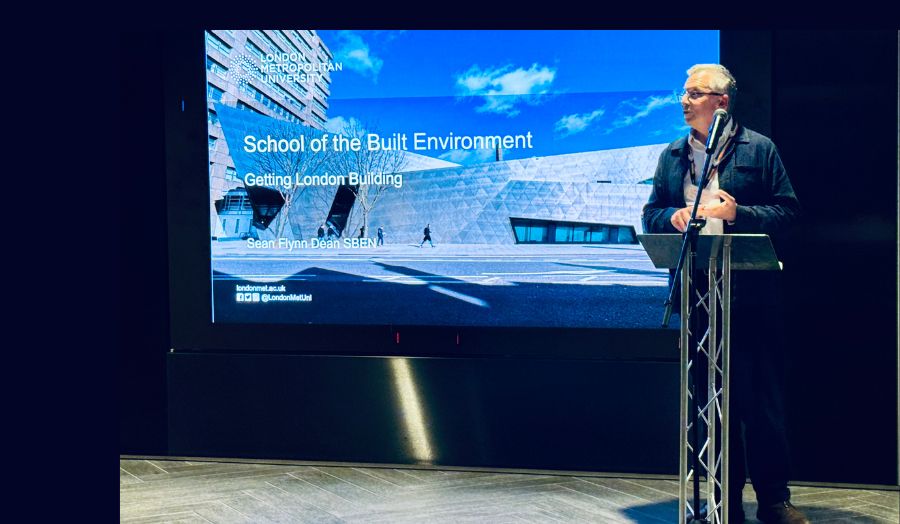Apply for this course
Please select when you would like to start:
Use the apply button to begin your application.
If you require a Student visa and wish to study a postgraduate course on a part-time basis, please read our how to apply information for international students to ensure you have all the details you need about the application process.
Why study this course?
With factors like the expanding population and new technologies on the rise, projects are becoming bigger and more complex. Skilled project managers are not only in high demand across the globe but also play a vital role in any project team.
Here at London Met, we’ve designed this course so you can grow your knowledge and expertise in all aspects of project management, from devising strategies to kickstart a project to analysing business goals, controlling resources, onboarding project stakeholders, and successful project delivery.
Combining theory and practical work, on this MSc you’ll have the chance to engage in authentic learning experiences and assessments, while getting hands-on in supporting real-world projects. What’s more, you’ll gain valuable experience collaborating with established national and international organisations. Through active project visits, you’ll gain first hand exposure to the challenges, excitement and career prospects this line of work has to offer.
London Met maintains strong connections with employers across all aspects of project management, involving them in both our Project Management MSc curriculum design and aspects of our career education services.
Experience all of this while studying at our lively Holloway campus, conveniently located just a short tube ride away from both the City and the West End.
Benefit from our industry links
We maintain strong connections with employers across all aspects of project management, involving them in both our Project Management MSc curriculum design and aspects of our career education services
Develop your employability
You'll learn key transferrable skills such as strategic procurement, design, assembling a cross-disciplinary project team, establishing project objectives, finance and monitoring progress within a dynamic project environment
Benefit from extra-curricular activities
You’ll take part in various site visits, live industry projects, and have the option to attend exciting guest lectures
Course modules
The modules listed below are for the academic year 2024/25 and represent the course modules at this time. Modules and module details (including, but not limited to, location and time) are subject to change over time.
Year modules
Applied Research Project
This module currently runs:all year (September start) - Thursday afternoon
(core, 60 credits)
The module will provide students with the opportunity to undertake an in-depth study of a subject which is of personal and subject interest in the field of the built environment. Students may focus their research upon a topic or problem relevant to their current programme of study and based upon an academic subject of interest, their current work practice or recent work experience or placement. The submission will take the form of a dissertation.
Students are encouraged to develop their critical thinking and undertake rigorous and theoretically informed research. The module will develop the student’s understanding of the linkages between conceptual issues, subject area, and research methods.
The module will introduce students to research methods and strategies which are appropriate to their area of study. It will provide the student with experience in the planning and implementation of a research project and the subsequent writing up of research findings in a dissertation and encourage students to undertake critical thinking.
Read full detailsBenefits Management and Project Success
This module currently runs:autumn semester - Thursday afternoon
(core, 20 credits)
The module is designed to provide you with a comprehensive understanding of how to manage and measure benefits to the organisation. You will learn how to assess the return on investment (ROI) and have an awareness of the broader social and environmental impacts (Social Value) of projects. In today's dynamic business environment, organisations should optimise financial returns while also considering their societal and environmental contributions.
Upon completion of this module, you will be equipped with the requisite knowledge and competencies to excel in project management, empowering you to maximise project success across multiple dimensions, balancing the financial bottom line with societal and environmental contributions.
Read full detailsBuilding a Successful Project Team
This module currently runs:spring semester - Thursday morning
(core, 20 credits)
The module aims to develop a critical awareness of the people dimension of projects and will address the principles of project team development. It will look at the role soft skills play in the successful delivery of a project and how a mastery of leadership and motivating your project team can help you build and maintain a successful and focussed project team. It will address how to distinguish between different types of change projects and propose techniques in leading teams to achieve organisational change
The knowledge gained will enable the student to develop strategies to form and maintain integrated project teams.
By the end of the module students should be able to critically evaluate the following:
- the role of soft skills in project management
- stakeholders and relationships present in a project
- means to select and maintain a project team
- group dynamics
- managing change
- the role of corporate social responsibility in project delivery
- methods to manage and resolve conflicts within a project team
- decision making and problem-solving processes associated with complex and unpredictable solutions.
- Gender representation within the built environment
Contemporary Project Management Practice
This module currently runs:spring semester - Monday morning
(core, 20 credits)
Through studying this module, you will develop a critical awareness and understanding of the application of leading contemporary project management methodologies (principles, tools and techniques) and how these contribute to the successful delivery of projects. It will take a detailed look at the management of the project lifecycle. It will consider the role of project management and project managers in the global move towards a sustainable and low/zero carbon future.
You will evaluate and apply a project management methodology such as Waterfall, Agile, Scrum, Kanban, Lean, Hybrid, and PRINCE2 alongside project management bodies of knowledge as defined by professional bodies such as Association for Project Management (APM), the Project Management Institute (PMI), and the International Project Management Association (IPMA).
By the end of the module, you will be able to critically evaluate:
• the challenges in leading a different project types.
• various project management methodologies and practices.
• the selection and application of a suitable project management methodology.
• contributions the project methodology and project manager can make towards sustainable project management.
Managing Risk and Uncertainty
This module currently runs:spring semester - Monday afternoon
spring semester - Thursday afternoon
(core, 20 credits)
The aim of this module is to provide the student with knowledge and understanding of risk and uncertainty theories and an appreciation of the differences between risks found on different project types.
Responding to today’s highly complex project landscapes, the module looks at risk management in a contemporary way, including complex projects which involve an unusual degree of uncertainty and unpredictability.
The module will introduce students to risk analysis techniques and how they can help the project team in making decisions under a highly dynamic project landscape. It will provide students with the tools to identify and assess risk and make informed decisions including how to manage risks within the context of a changing project environment. The module looks at “managing change” from the perspective of the risks involved.
By the end of the module students should be able to critically evaluate the following:
- The level of individual element and overall project risk
- Project complexity and risk
- Tools available to manage qualitative and quantitative project risks
- Appropriate means to manage risk
- The links between project change and risks
Project Management Principles
This module currently runs:autumn semester - Monday morning
spring semester - Monday morning
(core, 20 credits)
This module will introduce the student to the fundamental theories and concepts for successful project management. It examines the theory behind project management and best practice in the built environment industries in a local and a global context. It will consider how organisational strategic objectives drive projects and the role the project manager performs in the early stages of the project lifecycle, including the development and use of models to drive portfolio and project management. Following this it will move the focus to the operational stage of the project and how the key project objectives are identified and managed towards a successful project completion.
The syllabus is guided by professional body project management bodies of knowledge and codes of practice (such as the APM and CIOB). The module explains the strategic context within which projects operate to enable the students to understand that a project needs to have a strategic fit with the organisation's wider aims and ambitions. By the end of the module students should be able to critically evaluate the following:
- the link between organisational strategy, programmes, and projects
- project economics
- project finance mechanisms
- project management methodologies and their underpinning theories
- the challenges of leading a complex project
- the contribution project management makes towards a sustainable built environment
- the responsibilities of the modern global project manager
- strategies to monitor and control the complete project lifecycle
Project Planning and Execution
This module currently runs:autumn semester - Monday afternoon
(core, 20 credits)
Through studying this module, you will develop a critical awareness of project planning and execution principles alongside developing the skills necessary to deploy them to manage a variety of project types. Through enquiry-based learning it will facilitate a project scenario to allow you to deploy the tools necessary to successfully plan a project and monitor a project's resources.
The syllabus is guided by professional body project management bodies of knowledge and codes of practice such as the APM BOK and the PMI PMBOK. The module explores the planning of a project across the project lifecycle to enable you to understand that detailed planning of a project is needed to help in the successful execution of each project phase. By the end of the module, you should be able to critically evaluate the following:
• Defining project outputs including success and benefits; objectives and requirements; options and solutions; scope definition and quality planning.
• Integrated project planning and the creation of a baseline project plan.
• Progress monitoring during the project execution phase.


















.png)





